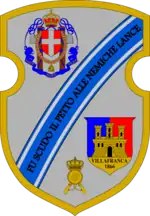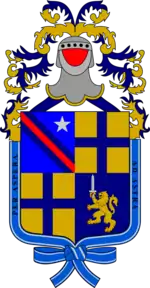49th Infantry Division Parma
The 49th Infantry Division Parma was an infantry division of the Italian Army during World War II. The Parma Division was a regular division of the Italian Army, formed 12 September 1939 in Macerata, and dissolved 8 September 1943 in Vlorë.[2]
| 49th Infantry Division Parma | |
|---|---|
 49th Infantry Division Parma Insignia | |
| Active | 1939–1943 |
| Country | Italy |
| Branch | Italian Army |
| Type | Infantry |
| Size | Division |
| Nickname(s) | Parma |
| Engagements | World War II |
| Commanders | |
| Notable commanders | Gen. D. Attilio Grattarola[1] Gen. B. Emilio Battisti Gen. B. Ugo Adami Gen. B. Paolo Micheletti Gen. B. Luigi Podio Gen. B. Enrico Lugli |
Actions
By 10 June 1940, the Parma division was still in Macerata and did not participate in the Italian invasion of France. The orders to move to Albania were received in September, 1940, and by 28 October 1940, at the start of Greco-Italian War, the division was fully deployed on Greco-Albanian border on the south of Lake Prespa, from Maja e Kallogjerit to Dobranj, being the part of the Italian XXVI Corps. The Parma was forced to start a retreat from upper flow of Devoll 30 October 1940. 31 October 1940, the town of Bitinckë and villages of Tren and Vërnik were also abandoned. The Greek attack on Ponçarë was repelled 1 November 1940, as well as attack on a mountaintop position on southern flank 2 November 1940. While Ponçarë was orderly evacuated 3 November 1940, the Greek breakthrough at Maja e Kallogjerit the same day have resulted in loss of Cerjë town and the crumple of Italian defences on the Devoll river. From 6 November the Greek forces have started to exploit a breakthrough, clashing with Italians at Bilisht first. 14 November 1940 the heavy clashes were recorded at Menkulas and Koshnicë, 15 November 1940 - at Gjyras, 16 November - at Drenovë south of Korçë. From 17 to 19 November 1940, a fierce fighting raged at mountain pass leading to Boboshticë. The pass changed hands several times. 21 November 1940, the Parma division was relieved from the front line duties and replaced by 2nd Alpine Division Tridentina. The Parma has returned to the front lines 12 December 1940 in the sector Mjetë - Mëlovë - Maja e Kulmakës. Immediately the Greek pushed an attack at Mëlovë and then Zaloshnjë. The Parma division have retreated in good order down the Tomorrica river valley, managing to stop a Greek advance 15 December 1940. The further severe Greek attacks 30–31 December 1940 made Parma to retreat to Lemnushë - Mal Tomor line. The initiative then passed to the Parma division which managed to capture and held the Dobrenjë 24 January 1941. While the mountaintop positions were secured, the Italian assault on valley between Dobrenjë and Tomorrica river has bogged down and stalled. With the start of Battle of Greece, the Parma has captured Mali i Kulmakës 14 April 1941, at which point the contact with the retreating Greek army was lost. To catch up, the Parma has moved to Osum valley near Këlcyrë 15 April 1941. By 19 April 1941 it was also in firm control of the Korçë-Ersekë railway. After overcoming some Greek resistance at Ikinas and Borovë, it reached the border cross of Perati by 30 April 1941.[3] In 1942-1943, the Parma division was still in Albania, performing anti-partisan and coastal defence duties in Tepelenë-Gjirokastër-Himarë-Vlorë region. The division ceased to exist 8 September 1943, in the chaos following the announcement of the Armistice of Cassibile.
Orders of battle


Order of battle (1940)
- 49. Parma Infantry Regiment
- 50. Parma Infantry Regiment
- 49. Artillery Regiment
- 1. Artillery group
- 2. Artillery group
- 3. Artillery group
- 109a. CCNN Legion
- 109. CCNN Battalion "F. Corridoni"
- 49. Mortar Battalion da 81
- 49a. Anti-Tank Company da 47/32
- 49a. Mixed telegraph/radio Signal Company
- 49a. Pioneer Company
- 62a. Medical Section
- 85a. Supply Section
- 74a. Field Bakery [nb 1][2]
Notes
- Footnotes
- An Italian Infantry Division normally consisted of two Infantry Regiments (three Battalions each), an Artillery Regiment, a Mortar Battalion (two companies), an Anti Tank Company, a Blackshirt Legion of two Battalions was sometimes attached. Each Division had only about 7,000 men, The Infantry and Artillery Regiments contained 1,650 men, the Blackshirt Legion 1,200, each company 150 men.[4]
- Citations
- Enrico Tagliazucchi and Franco Agostini. "Royal Italian Army". World War II Armed Forces – Orders of Battle and Organizations. Archived from the original on 4 April 2009. Retrieved 4 May 2009.
- Marcus Wendal. "Italian Army". Axis History. Retrieved 28 April 2009.
- http://www.regioesercito.it/reparti/fanteria/rediv49.htm
- Paoletti, p 170